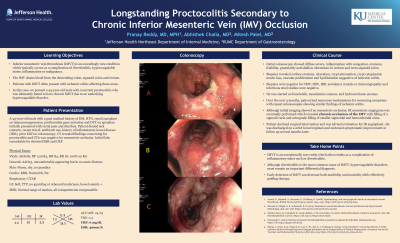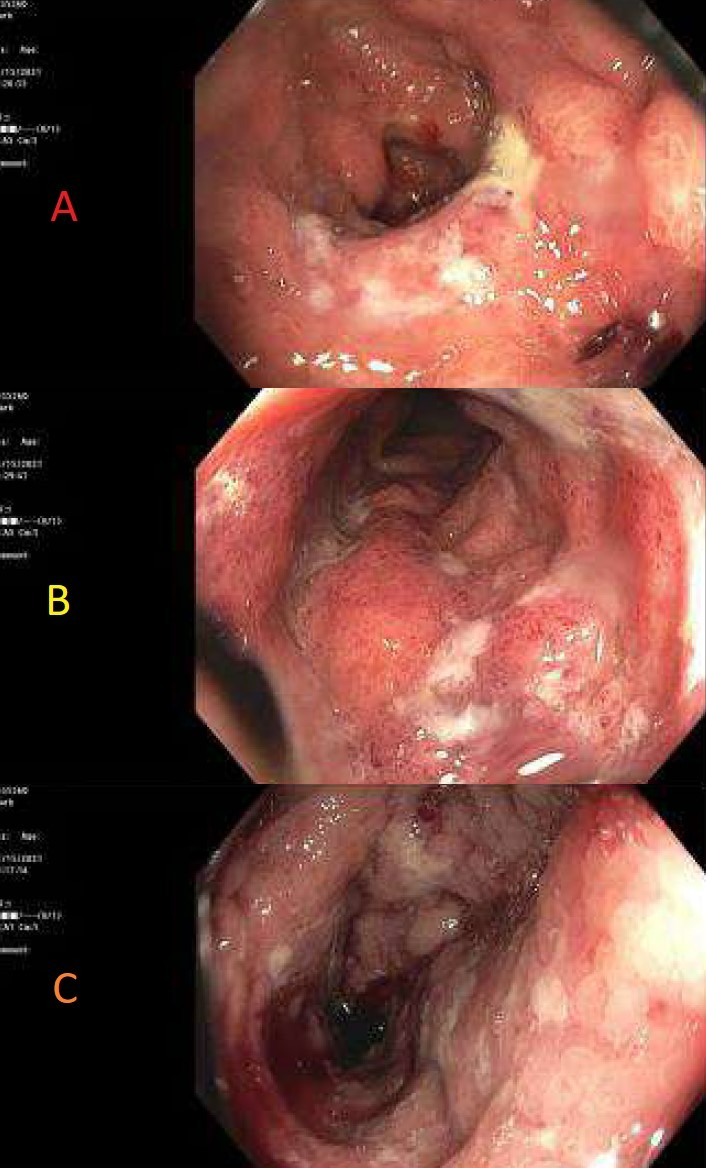Back


Poster Session A - Sunday Afternoon
Category: Colon
A0135 - Longstanding Proctocolitis Secondary to Chronic Inferior Mesenteric Vein (IMV) Occlusion
Sunday, October 23, 2022
5:00 PM – 7:00 PM ET
Location: Crown Ballroom

Has Audio

Pranay Reddy, MD, MPH
Jefferson Health Northeast
Philadelphia, PA
Presenting Author(s)
Pranay Reddy, MD, MPH1, Abhishek Challa, MD2, Mitesh Patel, MD3
1Jefferson Health Northeast, Philadelphia, PA; 2Kansas University Medical Center, Kansas City, KS; 3University of Kansas Medical Center, Kansas City, KS
Introduction: Inferior mesenteric vein thrombosis (IMVT) is an exceedingly rare condition which typically occurs as a complication of diverticulitis, hypercoagulable states, inflammation or malignancy. The IMV drains blood from the descending colon, sigmoid colon and rectum. Patients with IMVT often present with ischemic colitis affecting these areas. In this case, we present a 43-year-old male with recurrent proctocolitis who was ultimately found to have chronic IMVT due to an underlying hypercoagulable disorder.
Case Description/Methods: A 43-year-old male with a past medical history of DM, HTN, renal transplant on immunosuppression, prothrombin gene mutation and DVT on apixaban initially presented with rectal pain and diarrhea of one month duration. Patient denied sick contacts, recent travel, antibiotic use, history of inflammatory bowel disease (IBD), prior EGD or colonoscopy. CT revealed findings concerning for proctocolitis and CTA was negative for mesenteric occlusion. Labs remarkable for elevated CRP and ESR. Initial colonoscopy showed diffuse severe, inflammation with congestion, erosions, friability, granularity and shallow ulcerations in rectum and recto-sigmoid colon. Biopsies revealed surface erosions, ulceration, crypt attenuation, crypt cytoplasmic mucin loss, vascular proliferation and hyalinization suggestive of ischemic colitis. Biopsies were negative for CMV, HSV, IBD, sevelamer crystals or microangiopathy and infectious stool studies were negative. He was started on linaclotide, mesalamine enemas, and hydrocortisone enemas. Over the next 3 months, patient had numerous readmissions for worsening symptoms with repeat colonoscopies showing similar findings of ischemic colitis. Although initial imaging showed no mesenteric occlusion, IR mesenteric angiogram was eventually performed which revealed chronic occlusion of the IMV with filling of a sigmoid varix and retrograde filling of smaller sigmoidal and hemorrhoidal veins. Patient declined surgical intervention and was advised evaluation for IR angioplasty. He was discharged on a strict bowel regimen and endorsed symptomatic improvement at follow up several months later.
Discussion: IMVT is an exceptionally rare entity which often results as a complication of inflammatory states such as diverticulitis. Although diverticulitis is the most common cause of IMVT, hypercoagulable disorders must remain an important differential diagnosis. Early detection of IMVT can decrease both morbidity and mortality while effectively guiding therapy.

Disclosures:
Pranay Reddy, MD, MPH1, Abhishek Challa, MD2, Mitesh Patel, MD3. A0135 - Longstanding Proctocolitis Secondary to Chronic Inferior Mesenteric Vein (IMV) Occlusion, ACG 2022 Annual Scientific Meeting Abstracts. Charlotte, NC: American College of Gastroenterology.
1Jefferson Health Northeast, Philadelphia, PA; 2Kansas University Medical Center, Kansas City, KS; 3University of Kansas Medical Center, Kansas City, KS
Introduction: Inferior mesenteric vein thrombosis (IMVT) is an exceedingly rare condition which typically occurs as a complication of diverticulitis, hypercoagulable states, inflammation or malignancy. The IMV drains blood from the descending colon, sigmoid colon and rectum. Patients with IMVT often present with ischemic colitis affecting these areas. In this case, we present a 43-year-old male with recurrent proctocolitis who was ultimately found to have chronic IMVT due to an underlying hypercoagulable disorder.
Case Description/Methods: A 43-year-old male with a past medical history of DM, HTN, renal transplant on immunosuppression, prothrombin gene mutation and DVT on apixaban initially presented with rectal pain and diarrhea of one month duration. Patient denied sick contacts, recent travel, antibiotic use, history of inflammatory bowel disease (IBD), prior EGD or colonoscopy. CT revealed findings concerning for proctocolitis and CTA was negative for mesenteric occlusion. Labs remarkable for elevated CRP and ESR. Initial colonoscopy showed diffuse severe, inflammation with congestion, erosions, friability, granularity and shallow ulcerations in rectum and recto-sigmoid colon. Biopsies revealed surface erosions, ulceration, crypt attenuation, crypt cytoplasmic mucin loss, vascular proliferation and hyalinization suggestive of ischemic colitis. Biopsies were negative for CMV, HSV, IBD, sevelamer crystals or microangiopathy and infectious stool studies were negative. He was started on linaclotide, mesalamine enemas, and hydrocortisone enemas. Over the next 3 months, patient had numerous readmissions for worsening symptoms with repeat colonoscopies showing similar findings of ischemic colitis. Although initial imaging showed no mesenteric occlusion, IR mesenteric angiogram was eventually performed which revealed chronic occlusion of the IMV with filling of a sigmoid varix and retrograde filling of smaller sigmoidal and hemorrhoidal veins. Patient declined surgical intervention and was advised evaluation for IR angioplasty. He was discharged on a strict bowel regimen and endorsed symptomatic improvement at follow up several months later.
Discussion: IMVT is an exceptionally rare entity which often results as a complication of inflammatory states such as diverticulitis. Although diverticulitis is the most common cause of IMVT, hypercoagulable disorders must remain an important differential diagnosis. Early detection of IMVT can decrease both morbidity and mortality while effectively guiding therapy.

Figure: A) Diffuse severe inflammation with mucosal friability and granularity of the descending colon
B) Diffuse severe inflammation with mucosal friability and erosions in sigmoid colon
C) Diffuse severe inflammation with congestion, friability, and shallow ulcerations in rectum with oozing
B) Diffuse severe inflammation with mucosal friability and erosions in sigmoid colon
C) Diffuse severe inflammation with congestion, friability, and shallow ulcerations in rectum with oozing
Disclosures:
Pranay Reddy indicated no relevant financial relationships.
Abhishek Challa indicated no relevant financial relationships.
Mitesh Patel indicated no relevant financial relationships.
Pranay Reddy, MD, MPH1, Abhishek Challa, MD2, Mitesh Patel, MD3. A0135 - Longstanding Proctocolitis Secondary to Chronic Inferior Mesenteric Vein (IMV) Occlusion, ACG 2022 Annual Scientific Meeting Abstracts. Charlotte, NC: American College of Gastroenterology.
